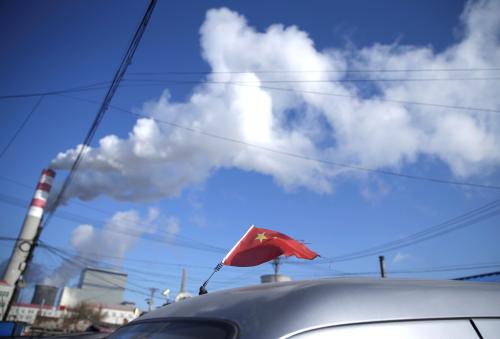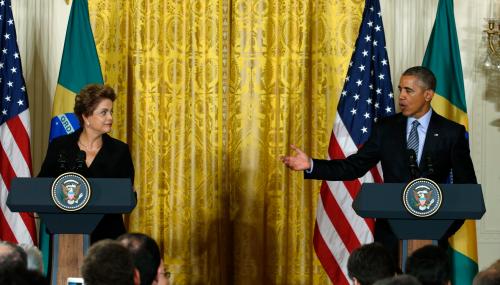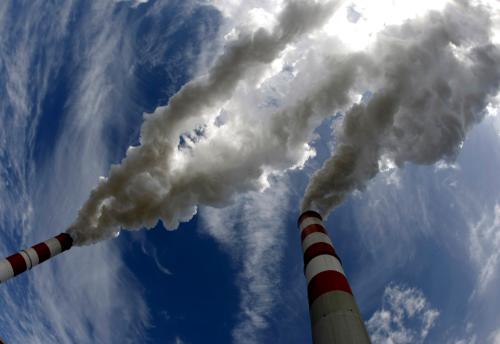After this blog was published, leaders at the G-7 agreed to a $20 million aid package to fight fires and restore rainforests in the Amazon.
As the G-7 members meet in Biarritz, France this weekend, the top concern for economic growth and people’s well-being—in developed and emerging countries alike—must be runaway climate change. CO2 emissions, the main source of human contributions to global warming, continue to rise among the top emitters, China, the U.S., and India (in that order)—largely driven by emissions from fossil fuels. And in Brazil, under the direction of President Jair Bolsonaro, there has been unprecedented deforestation of the Amazon rainforest, and an “international crisis” of devastating wildfires.
The crucial question is what the G-7 can do to arrest and reverse these trends as scientists warn that time is running out.
In Brazil, the global community should support and press for a change of course on the environment from within Brazil itself. Brazilians must offset the efforts of their president who is bent on promoting deforestation to benefit mining, logging, and cattle ranching. The entry point for a popular pushback is that Mr. Bolsonaro was elected—much like Donald Trump—on the false premise that reckless “deregulation” of the environment will boost economic growth. Brazil’s policymakers should take to heart the evidence that depleting natural capital, such as forests, hurts long-term growth and well-being. In the past half-century, there was not a steady pickup of growth from, say, illegal logging. In fact, the relation was the reverse, especially during periods of low deforestation that coincided with relatively strong growth, especially in agriculture.
Remote sensing by Brazil’s National Institute for Space Research shows a spike in deforestation since Bolsonaro took office in January 2019. Local temperatures are rising above global trends, producing longer dry seasons over the southern Amazon and widespread droughts and floods. Brazil’s National Centre for Monitoring and Early Warning of Natural Disasters warns of nearing a tipping point beyond which the rainforest ecosystem could collapse. Brazilians must clamor for an urgent change of direction in the country’s own interest.
Worldwide, carbon dioxide levels hit 415 parts per million in May and are increasing global temperatures. France recorded its highest-ever temperature on June 28 as continental Europe struggled with an intense heatwave. At the current rate, the catastrophic threshold of 450 ppm of atmospheric carbon would be breached in just 15 years.
To have any chance of ensuring robust economic growth, countries need to fast-track a twofold agenda of climate adaptation and climate mitigation. They need to adapt by building defenses to climate change. Japan, the Netherlands, and Singapore are leaders in building defenses against rising sea levels. Even if emerging economies cannot match the per capita incomes of these high-income economies, they need to double or triple their investment in climate resilience, especially as poorer nations pay a higher price for the death and destruction.
But adaptation without mitigation to decarbonize economies will not keep pace with runaway climate change. All countries, but especially the biggest emitters—China, the U.S., and India—need to switch from fossil fuels to renewable energy sources. The sliver of good news is that solar photovoltaics and wind energy, both non-carbon sources, have become mainstream options worldwide. The average cost of these two renewable power sources is now in the range of the cost of fossil fuels. Even so, renewable energy still accounts for only 17.5 percent of India’s electricity needs, with 80 percent coming from polluting fossil fuels.
The world is not on track to meet the Paris agreement targets. One reason is that renewable energy in transport, residential use, and industrial processes remains very low. Policy frameworks to support renewables and energy efficiency in industry and in buildings are patchy. Energy-related carbon dioxide is also rising because of increased fossil fuel consumption, encouraged by $400 billion in government subsidies, which increased by one-third in 2018.
The continued rise in carbon emissions is propelling a dangerous increase in global temperatures hurting economies and people’s well-being. To add to these woes, Brazil, with its new policy of deforestation, is turning the Amazon from a potential carbon sink to a major carbon emitter. The G-7 ought to take a position that can propel change. Economies, especially China, the U.S., and India, must switch radically from fossil fuel to renewable energy sources. Brazil, in its own economic interest, must reverse course on the destruction of the Amazon rainforest.
The Brookings Institution is committed to quality, independence, and impact.
We are supported by a diverse array of funders. In line with our values and policies, each Brookings publication represents the sole views of its author(s).







Commentary
For growth and well-being, climate crisis overshadows all else
August 23, 2019